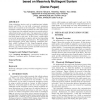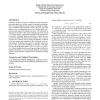123
Voted
ATAL
2008
Springer
15 years 4 months ago
2008
Springer
Using ubiquitous devices such as multifunctional cellular phones and PDAs, we can build a large-scale navigation system for evacuation in the metropolis. Although current navigati...
97
Voted
ATAL
2008
Springer
15 years 4 months ago
2008
Springer
In this paper we study tools for conviviality to develop user-friendly multiagent systems. First, we show how to use the social-cognitive concept of conviviality in multiagent sys...
133
Voted
ATAL
2008
Springer
15 years 4 months ago
2008
Springer
Many multiagent problems comprise subtasks which can be considered as reinforcement learning (RL) problems. In addition to classical temporal difference methods, evolutionary algo...
101
click to vote
ECAI
2006
Springer
15 years 5 months ago
2006
Springer
Being able to ensure that a multiagent system will not generate undesirable behaviors is essential within the context of critical applications (embedded systems or real-time system...
112
click to vote
ATAL
2006
Springer
15 years 6 months ago
2006
Springer
Multiagent probabilistic reasoning with multiply sectioned Bayesian networks requires interfacing agent subnets (the modeling task) subject to a set of conditions. To specify the ...
138
Voted
AGENTCL
2000
Springer
15 years 6 months ago
2000
Springer
The ability to communicate is one of the salient properties of agents. Although a number of agent communication languages (ACLs) have been developed, obtaining a suitable formal se...
128
Voted
ATAL
2003
Springer
15 years 7 months ago
2003
Springer
Distributed problem solving by a multiagent system represents a promising approach to solving complex computational problems. However, many multiagent systems require certain degr...
113
click to vote
ATAL
2003
Springer
15 years 7 months ago
2003
Springer
Abstract. Starting from a general definition of how to model the organisation of multiagent systems with the aid of holonic structures, we discuss design parameters for such struc...
114
Voted
ATAL
2003
Springer
15 years 7 months ago
2003
Springer
Much emphasis in multiagent reinforcement learning (MARL) research is placed on ensuring that MARL algorithms (eventually) converge to desirable equilibria. As in standard reinfor...
AI
2003
Springer
15 years 7 months ago
2003
Springer
Abstract. In this abstract, we present a complex multiagent environment, the RoboCupRescue simulation, and show some of the learning opportunities for the coordination of agents in...


